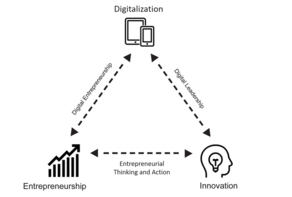Cowork4EU: Coworking Best Practices for European Universities
In the EU-funded Erasmus+ project "Cowork4EU", the Junior Professorship for Entrepreneurship and Digitalization of TU Dortmund University together with international partners from the Private University Schloss Seeburg in Austria (Ass.-Prof. Dr. Sandra Diller), Paris School of Business in France (Assoc. Prof. Ignasi Capdevila, PhD) and Prague University of Economics and Business in the Czech Republic (Assoc. Prof. Marko Orel, PhD) are researching best practices for the use of coworking in a university environment.
The project will pursue several project outcomes to better leverage the potential of coworking and coworking spaces at universities. For this purpose, a joint course focusing on coworking and the integration of coworking spaces in university teaching will be established. This will be piloted with students from the four partner universities and further developed through accompanying research. The curriculum will serve as a blueprint to support other faculty. In addition, the project team has set itself the goal of establishing an academic coworking network to further promote the exchange and mobility of students and researchers within Europe. The results of the project will be documented and published in the form of a best practice report.
The project duration is 36 months from 03.2022 to 02.2025.
The project leader and contact person for questions or cooperation offers is JProf. Dr. Simon Hensellek
The Cowork4EU project was funded by the Erasmus+ program of the European Union.

Results and findings from three years of Cowork4EU
The Erasmus+ project Cowork4EU: Coworking Best Practices for European Universities was successfully completed on February 28, 2025. For three years, the international project team, led by Professor Simon Hensellek, tested and researched the role of coworking spaces in the university environment and achieved significant successes in teaching, research and networking. On this page you will find an overview of the project, its results and successes as well as access to all freely available project outputs.
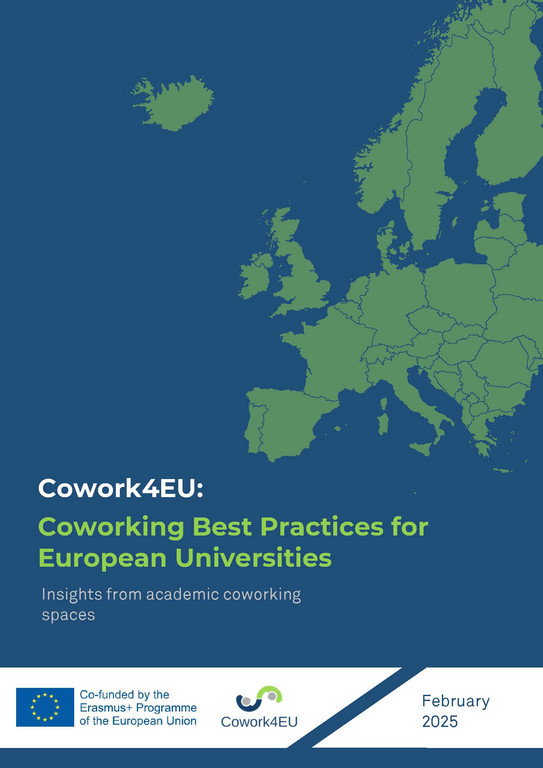
On 122 pages, the Cowork4EU Best Practice Report analyzes the role of coworking spaces in the university environment. It combines a well-founded theoretical discussion, based on a comprehensive analysis of scientific work and a large data set of European universities, with practical content such as case studies of prototypical university coworking spaces and concepts of ideal coworking spaces for students. The report also contains specific recommendations for researchers, coworking space managers, students, and university staff.
The report is available open access on common platforms such as Erasmus+, Eldorado, OSF, Google Scholar, and the Coworking Library and can be downloaded here free of charge:
Cowork4EU Best Practice Report
Discover exciting insights from the report below!
Coworking spaces in universities: Where innovation meets community
An increasing number of universities are establishing coworking spaces that offer students, researchers, and start-ups a flexible, professional working environment. In addition to working together and exchanging ideas, these spaces promote innovative collaboration and interdisciplinary cooperation. This opens up valuable opportunities for start-ups and founders in particular: They can access professional machines and innovative technologies to experiment and develop prototypes. This creates dynamic environments that foster creativity and collaboration in equal measure.
Coworking spaces as a networking hub in the university entrepreneurial ecosystem
University coworking spaces are central contact points for student start-ups and academic spin-offs. They are often linked to incubators or accelerator programs and offer young companies a cost-effective, flexible working environment - a decisive advantage in the early start-up phase. They also act as hands-on learning spaces where students and researchers develop entrepreneurial skills, learn from coaches and companies, and develop creative solutions through open exchange with other founders. This inspiring atmosphere promotes entrepreneurship, innovation, and the emergence of new business ideas.
Community building and networking: the social dimension of university coworking spaces
Coworking spaces at universities are much more than just places to work - they are lively meeting places for interdisciplinary exchange and collaboration between students, researchers, and externals, such as entrepreneurs or corporate employees. Their open structure helps to overcome social, professional, and academic barriers, strengthen a sense of belonging, and create a supportive community. Further, coworking spaces can serve as a safe space where students and researchers can openly discuss their challenges and experience mutual support.
Curious about the theoretical background and benefits of university coworking spaces? You can find the full chapter starting on page 7 of the Cowork4EU Best Practice Report:
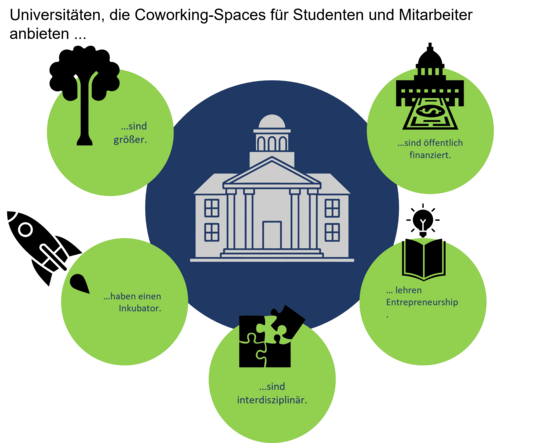
The number of coworking spaces increased by 152.9% between 2018 and 2024. This strong growth in popularity led to an increasing number of universities opening their own coworking spaces. As part of the Cowork4EU project, our research team collected data from 1,084 European universities and their coworking spaces. In total, 25.6% of European universities have such spaces. They are particularly widespread in Northern and Western Europe: 79.4% of all university coworking spaces are located in these regions. In countries such as Denmark (63%), France (60%), and Ireland (50%), more than half of universities have at least one coworking space. In contrast, they are less common in Southern and Eastern Europe, where only 10.5% of universities offer this infrastructure.
Coworking spaces are particularly common at universities with a broad range of different faculties, followed by universities with a technical, social science, or economic focus. Universities with an ecclesiastical, sports, or administrative focus, on the other hand, rarely have coworking spaces. However, the decisive factor is less the specific focus, but rather the entrepreneurial orientation of the university: 96.8% of university coworking spaces are located at universities that also offer incubators or accelerator programs for start-ups. At these institutions, coworking spaces often function as central points of contact for student founders and research-related spin-off teams.
Based on the data collected, a prototype of a university that is highly likely to operate a coworking space can be derived. These are usually large, publicly funded universities with a broad, interdisciplinary range of courses. This archetypal university not only promotes the exchange of knowledge across departments but also focuses on entrepreneurial activities by integrating incubators and accelerator programs. Students and researchers use these flexible workspaces for innovative, extracurricular projects and develop practical entrepreneurship. This makes the institution an ideal breeding ground for innovation and interdisciplinary collaboration.
You can find out more about the data on university coworking spaces and their institutes from page 26 of the Best Practice Report:
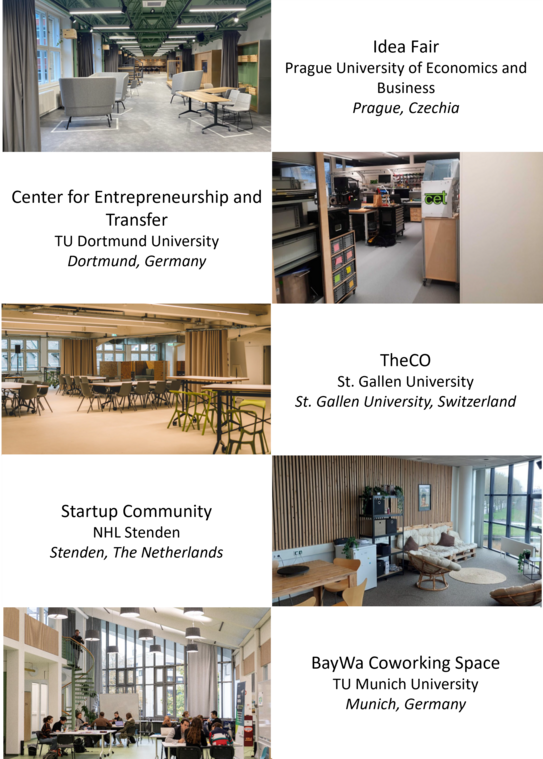
A typology of university coworking spaces
Based on the research results, university coworking spaces can be divided into four main types. As part of the report, we have developed a typology and conducted case studies in five university coworking spaces, which underpin each of these categories with concrete practical examples.
Education-oriented coworking spaces
These coworking spaces promote interactive learning and the teaching of entrepreneurial skills. One example is the Idea Fair at the Prague University of Economics and Business in the Czech Republic. It offers flexible workspaces for students and researchers from all disciplines and promotes the exchange between science, teaching, and practice through events and workshops. The Idea Fair also regularly hosts innovative teaching formats.
Technical coworking spaces
These spaces offer specialized infrastructure for technology-related projects, such as machines or devices for data and media processing. One example is the Center for Entrepreneurship and Transfer at TU Dortmund University, which not only provides office space and consulting services but also provides student entrepreneurs and researchers with various free-to-use technological resources. This includes high-end computers, a film and sound studio, 3D printers, CNC milling machines, and woodworking tools.
Business coworking spaces
These spaces support start-ups and entrepreneurial initiatives through networks, resources, and mentoring. TheCO at the University of St. Gallen combines coworking with targeted start-up support. In addition to flexible workspaces and conference rooms, the space offers networking events and coaching programs for founders. The startup community at NHL Stenden University in the Netherlands also acts as an innovation center for students, with office space, mentoring, and access to investors.
Research-oriented coworking spaces
These spaces serve as a platform for scientific exchange and interdisciplinary collaboration. One example is the BayWa CoWorking Space at TU Munich, which creates an open working environment for scientists and companies. The focus here is on cooperation between academic research and industry, supported by targeted programs and networks.
Would you like to find out more about the different typologies and the five case studies? You can find all the details in Chapter 4 of the Cowork4EU Best Practice Report from page 35:
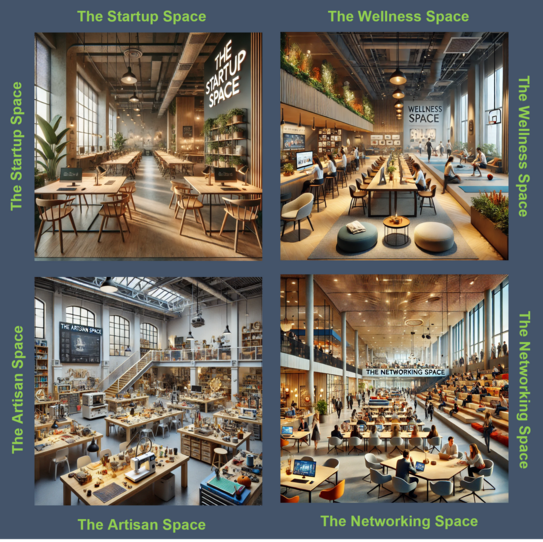
As part of the international coworking course, students developed four different concepts for university coworking spaces.
1. The Startup Space: Support for student founders
The Startup Space is aimed at students who are working on a business idea or have founded a company. This space type offers:
- Workspaces: Flexible and fixed workstations, private offices for advanced startups, meeting rooms.
- Technical equipment: prototyping tools, film and sound studios for creating marketing materials.
- Support & Programs: Incubation and accelerator programs, business consulting from university staff and external coaches.
- Networking: Regular networking events and pitch events to connect with investors and potential customers.
2 The Community Hub: Networking and social learning
This coworking space is a social meeting place for students and promotes interdisciplinary collaboration. Key features include:
- Flexibility: open group work areas, lounges, and event space.
- Community focus: Regular after-work events, cultural events, workshops.
- Co-learning & mentoring: Students support each other through peer mentoring and interactive learning formats.
3 The Well-Being Space: Focus on mental and physical health
A coworking space that creates a healthy working environment and focuses on the well-being of its users:
- Design & atmosphere: natural light, plants, ergonomic furniture, quiet zones.
- Health services: Yoga and mindfulness classes, sports facilities, healthy catering.
- Work-life balance: Flexible working hours, quiet retreats for concentrated work.
4 The Makerspace: Innovation lab for creative minds
A highly specialized coworking space for students with a focus on technology and design:
- Equipment: 3D printers, CNC milling machines, virtual reality labs, electronics workshops.
- Project funding: Support for creative and technical projects through expert coaching.
- Collaboration: exchange between students from engineering, design, and computer science.
Each of these concepts shows how diverse university coworking spaces can be. You can find out more about these concepts in Chapter 6 of the Cowork4EU Best Practice Report:
Based on the findings of the report, we have compiled recommendations for the management of university coworking spaces, students, and researchers, developing starting points for further research in this area.
1. Recommendations for the management of university coworking spaces
Our report highlights key aspects for the successful design and operation of university coworking spaces:
- Flexibility and spatial concept: Workspaces should offer both open zones for informal exchanges and quiet areas for focused work. A multifunctional room design makes it possible to meet the different needs of the community.
- Technological equipment: Modern digital tools and IT infrastructures are essential. They support the management of the spaces, enable hybrid working models, and promote digital networking.
- Community building and governance: Regular events, workshops, and informal exchange formats are crucial for building knowledge and networks. At the same time, clear rules and guidelines must be established for efficient collaboration.
- Sustainability and inclusion: Environmentally friendly materials, energy-efficient technology, and barrier-free design should be integral components of the concept of university coworking spaces.
2. Best practices for students
To exploit the full potential of coworking spaces, students should consider the following aspects:
- Active use of flexible spaces: Both open work areas and retreat zones should be used specifically for individual and collaborative work.
- Participation in networking formats: Workshops, mentoring, and networking events offer valuable interdisciplinary contacts.
- Expanding professional skills: Students should use the learning and further education opportunities in coworking spaces to acquire entrepreneurial and practical skills.
- Self-organization and personal responsibility: The independent use of digital tools and resources promotes essential skills that go beyond the regular curriculum.
3. Best practices for researchers
Researchers can also benefit from university coworking spaces in a variety of ways:
- Integration into everyday research: Coworking spaces offer a platform for interdisciplinary collaboration and can strengthen existing research networks or establish new ones.
- Innovative teaching and working formats: University coworking spaces are suitable for new didactic concepts and experimental methodological approaches.
- Promotion of cooperation: The use of coworking spaces can intensify the dialogue between science and external partners and promote the transfer of knowledge.
- Practice-oriented research: Cooperation with practice partners enables joint projects that link theory and practice more closely.
4 Starting points for further research
The findings of the Cowork4EU Best Practice Report show promising starting points for future scientific research:
- Evaluation of impact: Future studies could analyze the influence of university coworking spaces on learning outcomes, research successes, and innovation processes in greater depth.
- Optimization of spatial design: A detailed investigation of the ideal spatial concepts and the integration of digital technologies can provide valuable insights into the future of university learning and working environments.
- Community management strategies: Researchers can build on existing findings to develop effective management and maintenance concepts for university coworking communities.
Detailed scientific findings and specific recommendations for management, students, and researchers can be found in Chapter 7 of the Best Practice Report from page 94:
The European Academic Coworking Network
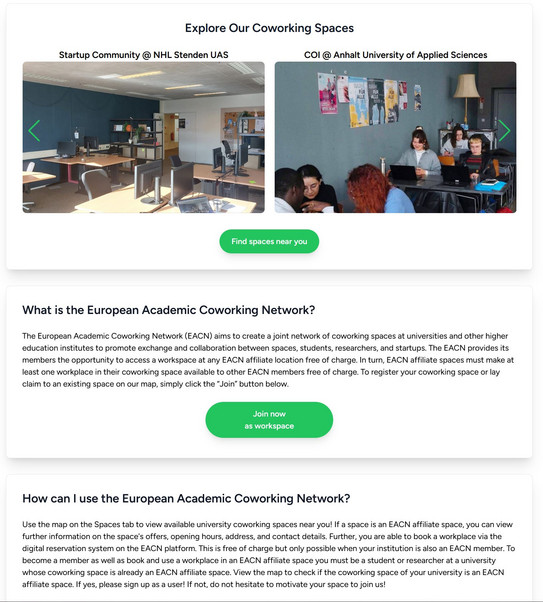
The European Academic Coworking Network (EACN) is a network that uses a digital platform to connect university coworking spaces in Europe. It offers students and researchers from EACN partner universities the opportunity to book free workspaces in one of the partner coworking spaces, similar to eduroam, but specifically for coworking. In addition to booking free workspaces, the EACN promotes interdisciplinary and international exchange, the efficient use of resources, and the development of innovative working models at European universities. The EACN also acts as an interactive map of academic coworking spaces in Europe.
EACN partner coworking spaces can present their offerings on their space's profile, including information on opening hours, contact details, and other details. In addition, coworking space managers can add images, a logo, and an informative description of the space. Once the space profile creation is complete, the new partner space is activated for all members of the university where the space is located. Workspace booking is fully automated, including email notifications for users and space managers.
The EACN will remain in place after the end of the Cowork4EU project and will continue to enable the booking of workspaces and the inclusion of new university coworking spaces. Follow-up projects are also planned to expand the network and platform functions.
Are you a manager of a university coworking space, a decision maker at a university, or are you interested in the EACN? Further information and the possibility to register can be found here:
European Academic Coworking Network
You are also welcome to contact the EACN team by email at admin@eacn.network. Further background information on the EACN, how the network works, and its future plans can be found in the fifth chapter of the Cowork4EU Best Practice Report from page 56:
The coworking courses
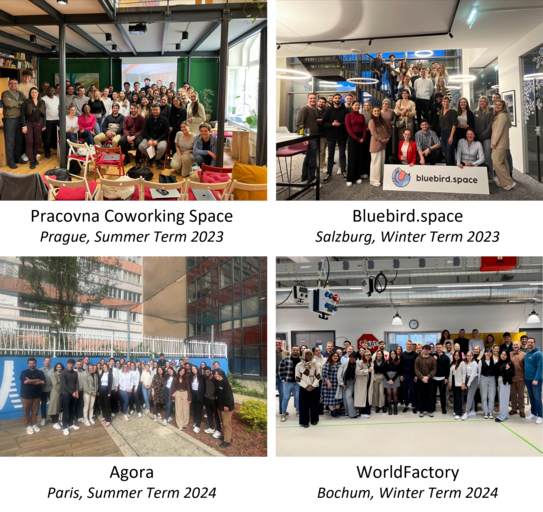
A total of 142 students from the Cowork4EU project partner universities took part in the innovative “International Coworking and Entrepreneurial Management” seminar in 2023 and 2024. The course took place four times and enabled students to develop innovative concepts for university coworking spaces in international teams. The highlight of each course was the two-day trip to the home city of one of the partner universities, which was supported by the EU. There, the students had the opportunity to work with their team in a coworking space and get to know the advantages and challenges of coworking spaces at first hand. At the end of their stay, their university coworking concepts were presented to an interdisciplinary jury of professors, coworking space managers, and coworkers. After the trip, the students used virtual coworking spaces to continue working in their teams. They concluded the seminar by submitting a detailed business plan that reflects their university coworking concept. You can find a short presentation of the course as a video, as well as an overview of all four seminars right here:
Surveys on coworking at universities
As part of the Cowork4EU project, the team conducted different surveys on university coworking spaces among students, coworking space managers, and academic staff. You can find a brief overview of the results here.
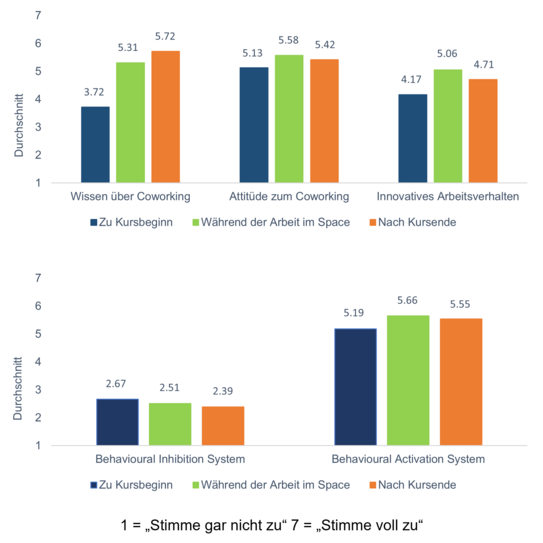
Students
A total of three surveys were completed during each course cohort by the participating students. Surveys were distributed before the course (before the kick-off date), during the course (during teamwork in the coworking space), and after the course (when the coursework was handed in). The aim was to record how working in a coworking space affects knowledge about coworking, attitudes towards this form of work, and innovative working behavior. In addition, the extent to which students react to potential threats with caution and the extent to which they are motivated to actively move towards positive goals and rewards was also investigated.
The results show that both knowledge about coworking and attitudes towards this way of working increased significantly during active work in the coworking space. Although the values fell slightly after the end of the course, they were still above the initial level. A similar pattern was also evident in innovative working behavior.
There were also comparable dynamics concerning emotional reactions: While cautious reactions to uncertainty decreased over the course, the approach to positive goals peaked during the time in the coworking space and dropped slightly towards the end of the course, but also remained above the initial level.
The results make this clear: Working in a coworking space not only strengthens knowledge and attitude but also promotes innovative thinking and an open, motivated, and action-oriented attitude.
Further surveys were distributed to coworking space management staff and academic staff. The survey asked participants about the various benefits and opportunities, as well as the negative aspects and challenges of university coworking. They were also questioned on the different target groups for whom university coworking spaces could be useful.
Coworking space management
The managers of university coworking spaces surveyed rated the relevance of coworking spaces as consistently positive. They considered the spaces to be particularly important for early-stage start-ups, female founders, and the local start-up ecosystem, while they were rated as less relevant for traditional company employees. They cited networking, collaboration, and community building as key benefits. Access to resources such as technical equipment, consulting services, and workshops was also highlighted by the participants. Affordable office space was less frequently cited as a key benefit.
The biggest challenges identified by coworking space management were the unfavourable location of their spaces, a lack of awareness, and insufficient capacity utilization. Financing problems or inadequate technical infrastructure were mentioned comparatively rarely. When it came to actually working in CWSs, managers saw noise and distraction as the main challenges.
According to the participants, the portfolio of university coworking spaces often includes meeting rooms, kitchens, lounges, and digital communication channels. However, 3D printers, childcare, and community apps are less common.
Academic staff
The academic staff surveyed, with and without access to their own coworking space, also highlighted networking and collaboration as the most important benefits. Interestingly, staff without their own coworking space rated networking and access to resources as more important, while colleagues with their own coworking space increasingly cited benefits such as knowledge sharing, interdisciplinary collaboration, and support for entrepreneurial activities. The role of coworking spaces in teaching was assessed rather cautiously overall.
Both groups cited noise and distraction as the biggest challenges. Academic staff without access to a coworking space were also more likely to cite a lack of retreat options, a lack of space, or a lack of adaptability. Issues such as organization, financing, or impairment of academic standards were rarely mentioned.
Concerning teaching in coworking spaces, respondents cited a functional room concept and an environment conducive to learning as the most important requirements. Access to technical equipment and a pleasant atmosphere were also emphasized. Employees without their own coworking space also placed greater value on aesthetic design and an inspiring environment.

